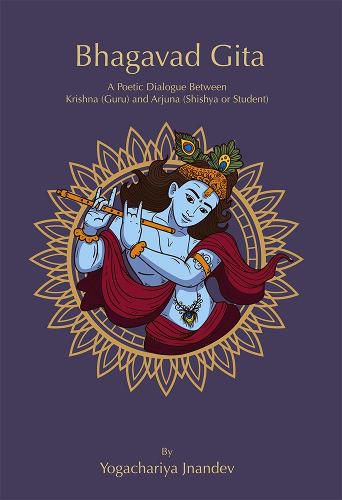Readings Newsletter
Become a Readings Member to make your shopping experience even easier.
Sign in or sign up for free!
You’re not far away from qualifying for FREE standard shipping within Australia
You’ve qualified for FREE standard shipping within Australia
The cart is loading…






This title is printed to order. This book may have been self-published. If so, we cannot guarantee the quality of the content. In the main most books will have gone through the editing process however some may not. We therefore suggest that you be aware of this before ordering this book. If in doubt check either the author or publisher’s details as we are unable to accept any returns unless they are faulty. Please contact us if you have any questions.
This book is an interpretation of this important Yogic scripture, of a dialogue between Lord Krishna the Divine and his dear friend Arjuna.
Krishna managed to counsel and convince Arjuna by teaching him lessons on Karma Yoga (doing all his actions without the desire for the fruit - niskama karma). Further Krishna reminds Arjuna of his Dharma as a Kshatriya (warrior with the ability to protect others) to fight against the negative forces.
Krishna explains the eternity of our atman or soul (jivatma) and higher truths are really about the Atman (self) and Parmatman (divine self).
He explained the idea of selfless action, surrendering fruits to the Divine.
The teachings of the Bhagavad Gita taught to Arjuna by Lord Krishna were not only meant for Arjuna. Lord Krishna took this opportunity to bless mankind with these spiritual teachings to help foster peace, love, compassion, harmony and righteousness along with self-realisation or Kaivalya.
These teachings can be seen as scientifically organised mental, emotional and spiritual counselling. There is an answer to all our inner battles, conflicts, confusions and delusions. The Bhagavad Gita explains the essence of the Vedic lifestyle in concepts of Karma and Dharma (righteousness) and attaining Moksha or Liberation. It emphasises the importance of fulfilling the purpose of life and facing all the ups and downs of life without being a victim, to live our life in balance and equanimity (Samatva).
$9.00 standard shipping within Australia
FREE standard shipping within Australia for orders over $100.00
Express & International shipping calculated at checkout
This title is printed to order. This book may have been self-published. If so, we cannot guarantee the quality of the content. In the main most books will have gone through the editing process however some may not. We therefore suggest that you be aware of this before ordering this book. If in doubt check either the author or publisher’s details as we are unable to accept any returns unless they are faulty. Please contact us if you have any questions.
This book is an interpretation of this important Yogic scripture, of a dialogue between Lord Krishna the Divine and his dear friend Arjuna.
Krishna managed to counsel and convince Arjuna by teaching him lessons on Karma Yoga (doing all his actions without the desire for the fruit - niskama karma). Further Krishna reminds Arjuna of his Dharma as a Kshatriya (warrior with the ability to protect others) to fight against the negative forces.
Krishna explains the eternity of our atman or soul (jivatma) and higher truths are really about the Atman (self) and Parmatman (divine self).
He explained the idea of selfless action, surrendering fruits to the Divine.
The teachings of the Bhagavad Gita taught to Arjuna by Lord Krishna were not only meant for Arjuna. Lord Krishna took this opportunity to bless mankind with these spiritual teachings to help foster peace, love, compassion, harmony and righteousness along with self-realisation or Kaivalya.
These teachings can be seen as scientifically organised mental, emotional and spiritual counselling. There is an answer to all our inner battles, conflicts, confusions and delusions. The Bhagavad Gita explains the essence of the Vedic lifestyle in concepts of Karma and Dharma (righteousness) and attaining Moksha or Liberation. It emphasises the importance of fulfilling the purpose of life and facing all the ups and downs of life without being a victim, to live our life in balance and equanimity (Samatva).